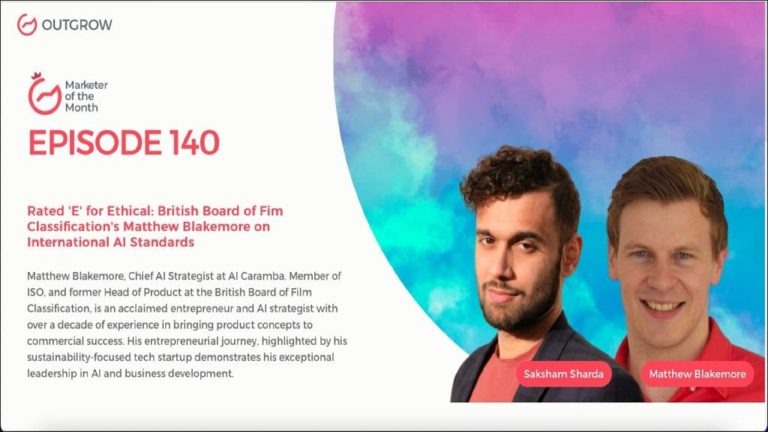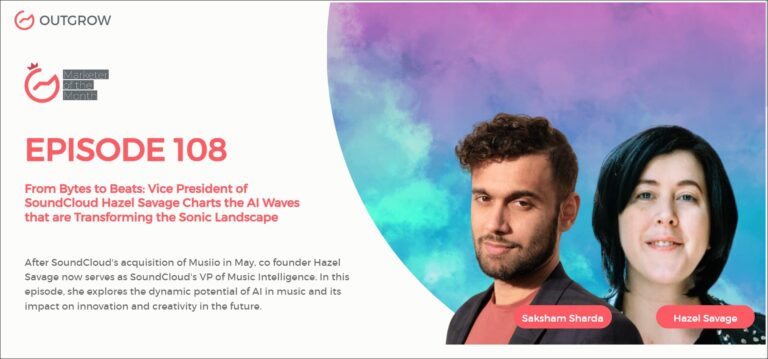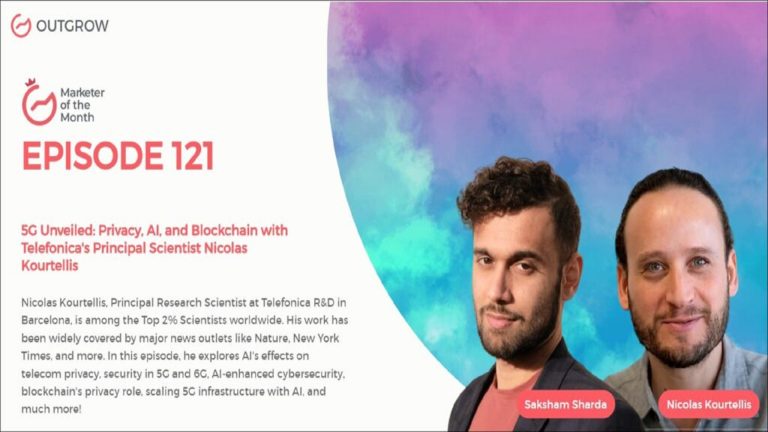Hey there! Welcome to the Marketer Of The Month blog!

We recently interviewed Jeff Bullas for our Marketer of the Month Podcast. We had an incredibly informative and insightful conversation with Jeff. Here’s all that we discussed –
- A unique aspect about social media in 2009 and how it has changed
- Capitalization of social media and the incomprehensible algorithms
- What democratized media will look like in the future
- How he built a 25 million+ readership
- One significant way in which he is using AI in his business
- His long term prediction on the future of the internet
About our host:
Dr. Saksham Sharda is the Chief Information Officer at Outgrow.co He specializes in data collection, analysis, filtering, and transfer by the means of widgets and applets. Interactive, cultural, and trending widgets designed by him have been featured on TrendHunter, Alibaba, ProductHunt, New York Marketing Association, FactoryBerlin, Digimarcon Silicon Valley, and at The European Affiliate Summit.
About our guest:
Jeff Bullas is a digital entrepreneur, marketing blogger, keynote speaker, digital strategist, and bestselling author. His mission is to “Inspire and educate entrepreneurs to grow their business in a digital world”. The jeffbullas.com website receives over 5 million visitors a year. Among other achievements, he has been listed on Forbes as one of the “Top 20 Influencers of CMO’s”.
The Podcast – Future of Internet, Algorithms, and Democratized Media with Jeff Bullas.
The Podcast: – Future of Internet, Algorithms, and Democratized Media with Jeff Bullas
Table of Contents
Introduction:

Saksham Sharda: This is Dr. Saksham Sharda. I am the Creative Director at Outgrow. co. And for this month, we are going to interview Jeff Bullas, who is the CEO at JeffBullas.com. Thank you for joining us, Jeff.
Jeff Bullas: It’s an absolute pleasure.
Rapid Fire Round:
Saksham Sharda: So Jeff, we’re going to start with a rapid-fire round just to break the ice. You get three passes. In case you don’t want to answer the question, you can just say pass, but try to keep your answers to one word or one sentence only. Okay.
Jeff Bullas: Okay.
Saksham Sharda: The first one, how long does it take you to get ready in the morning?
Jeff Bullas: As long as it takes
Saksham Sharda: The most embarrassing moment of your life?
Jeff Bullas: Ah, uh, getting married twice.
Saksham Sharda: How many hours of sleep can you survive on?
Jeff Bullas: Four to six?
Saksham: Fill in the blank – An upcoming marketing trend is ______
Jeff: Content created by artificial intelligence,
Saksham Sharda: The city in which the best kiss of your life happened,
Jeff Bullas: Gerringong
Saksham Sharda: Pick one, Mark Zuckerberg or Jack Dorsey.
Jeff Bullas: Jack Dorsey.
Saksham Sharda: The first movie that comes to your mind when I say the word “ambition.”
Jeff Bullas: Steve Jobs – The Movie. Yeah.
Saksham Sharda: When did you last cry and why?
Jeff Bullas: Uh, more moist than crying. Hm. My children.
Saksham Sharda: Okay. The biggest mistake of your career?
Jeff Bullas: Not starting soon enough.
Saksham Sharda: Okay. With that pause like I thought you were going to say “my children” once again. How do you relax?
Jeff Bullas: Meditate, cycle, and read.
Saksham Sharda: Okay. How many cups of coffee do you drink per day?
Jeff Bullas: Five
Saksham Sharda: A habit of yours that you hate?
Jeff Bullas: Picking my nose.
Saksham Sharda: Sucks it’s a video interview, but okay. The most valuable skill you’ve learned in life?
Jeff Bullas: Writing.
Saksham Sharda: And the last question is your favorite Netflix show.
Jeff Bullas: I’m trying to divide between Netflix and whatever. Netflix show. This is going to require a bit of editing.
Saksham Sharda: Oh no, wait, we just got to like, let this play because this is a rapid-fire round and you made a mistake.
Jeff Bullas: I know. A Netflix show…
Saksham Sharda: Or you can just name any show. It’s okay.
Jeff Bullas: What collar.
Saksham Sharda: Okay. I’m not even sure if it’s a Netflix show or not, but I’ll accept that answer.
Jeff Bullas: It’s not actually, it’s Amazon Prime.
Saksham Sharda: Well, that was the end of the rapid-fire round. You’ve scored nine on 10 because you rarely did bust up the whole Netflix show thing, but that’s okay. Uh, you win a car, just kidding you don’t but yeah.
The Bigger Questions:

Saksham Sharda: All right. So let’s go into the bigger questions. The first one is, uh, so tell us one unique thing about social media in 2009, when you just started building JeffBullas.com and how has that changed now, over the years?
Jeff Bullas: Social media in 2009 was without filters. It was just raw and it was like the wild west.
It was beautiful because you could connect with your tribe and build them organically today. Today, the media, the new media moguls, and that includes Mark Zuckerberg and also Twitter and others, um, have decided they want to filter you and put algorithms around what they deem to be important for you.
So we’ve now gone from raw unfiltered social media to filtered algorithmic, social media that is filtered by the platforms and. And the algorithms extend way beyond social media. They extend to emails, what appears in your inbox? What goes to spam. It extends to what is seen in your Amazon filters.
It’s what’s seen in your Spotify, it’s what’s seen in your Netflix. So you are being filtered by the robots and it even stops you from placing advertising on Google or Facebook because the algorithms and the robots are determining what is approved and what isn’t without human insight. And we all know the challenge with that is that because everything is done at an enormous global scale.
So humans intervening in filtering is essentially impossible, but I think we’re at the start of a real challenge where AI is also at its raw stage where it’s, a blunt force instrument that is determining what you’re seeing, what you don’t see, what you read and what you don’t read or what you can and can’t do.
And that is a real challenge. So, the difference, in one sentence is – we started with raw unfiltered social media, where you can connect with the tribe organically. We’ve moved to pay-to-play algorithms, determining who sees you and who doesn’t see you. Hmm.
Saksham Sharda: And this is something that the American government has been taking on because having two political parties means that whatever side social media is on is immediately a problem for the other political party.
And I think one of the Chairs of the Committee, made the point that social media had two options – either to go try to be a phone, like a phone, like when you’re calling someone, right. It’s not getting filtered, right? So you either just become a communications platform that is completely unmonitored, or you take the other thing where you’re filtering stuff, but who decides what is to be filtered and what’s not.
And as you’re saying, when robots take over, then at some point we kind of lose track of the system.
Jeff Bullas: Yep. And the other challenge I think, is that the algorithms, but also giving attention to what provides more traffic and attention, essentially, that challenge is that drama and negativity rise to the top.
In other words, the garbage rises to the top, not the good stuff. And that I think is another problem that we have with the algorithms. And we also, the challenge is that, uh, the filters are also keeping us within bubbles rather than allowing us to actually discover things that will challenge our perception of the world and our templates and our way of thinking.
So what happens is we’re just being filtered into more and more intense, small bubbles, and that’s a challenge globally.
Saksham Sharda: And how do you think it’s affecting companies in particular? Because I know a couple of years ago, Facebook already said they’re going to restrict company feeds from showing and people’s like, you know, normal feeds.
Because I think I’ve seen much fewer company normal posts, but sponsored posts I’ve seen, but not like normal posts that they post.
Jeff Bullas: Yeah. So that’s the thing is that they’re filtering out anything organic. They’re actually promoting anything that makes money. So the platforms have become more about making money for the media moguls than about providing.
That’s what they’re gonna do once, you know, the big banks with Facebook had done after they went public because then they’re beholden to the shareholders. They said, how are you making money? And guess what? So what was fabulous from 2009 to 2013 & 14 was we had five years of pure, really global social media tribes, collecting and sharing with no filters, with no censorship effectively.
And as we had the corporatization of social media, as they became public companies, the issue became that it’s all about making money. So social media started with, I wouldn’t say the right intentions because essentially it was like, Facebook was about voting on who is the best looking girl.
Right. It was a little bit of a dating site, in one sense. Very non-PC uh, but yeah. Any technology is used for good or for evil. And that’s the challenge we’re facing today is that the power of the platforms is revealing itself. And it’s, I think that these platforms by their actions are almost begging to be, I suppose, begging to be rules made for them,
We’ve seen the abuse of privacy, with the EU bringing in rules for that. Um, so yeah, there’s a lot going on. So 2009 versus 2021, it’s a huge difference.
Saksham Sharda: And so I guess, in a sense, if we had to go back to a 2009 level of social media, then we would see new social networks crop up that don’t follow these rules.
And because there’s a market, suddenly there’s a market for new social networks that don’t follow these rules of censorship or filtering all of this. So for instance, Clubhouse, you can’t actually censor anything on Clubhouse because it’s a live meeting and that’s the unique thing about it. Like, you know, anything that’s said on it remains there. There is no filter that can remove it from there.
Jeff Bullas: You know, Clubhouse, I believe, this stuff had some serious traffic declines recently.
Saksham Sharda: Um, that’s true.
Jeff Bullas: And, the reality is that we’re, us as human beings, we’ve got limited attention, got limited time. Um, and the reality is that, uh, we can only, so the big platforms get most of our attention.
You know, Snapchat suffered, Facebook copied, Instagram copied, Clubhouse has risen. Twitter stayed at much the same level of followers. Yeah, daily users, Twitter has moved more into providing a platform for political leaders and celebrities. Um, so, uh, yeah, we’re in the middle. This is the organic development evolution of platforms for anyone to break through that noise is going to be a challenge for anyone.
So network effects essentially, yeah, giving the bigger players more attention and the small players much harder to break through. Um, and I think more government regulation is certainly going to creep in over the next decade, to make sure that, uh, the bad actors don’t take over the platforms because they get more attention because that’s what sells – more traffic and clicks.
And that’s the challenge for the, you know, the big platforms they are about making money. Um, I remember 10 years ago and seeing I was so excited by social media because it democratized publishing globally. We were able to get our voice out to the world, share our creations with the world. Guess what, it’s almost impossible now to grow organically, unless you’re a celebrity or, and appear on mainstream TV as well as social media.
And, uh, so the reality is, uh, that we have new gatekeepers. We used to have media moguls where you had to pay for attention, such as you know, mass media. Um, today we have more other gatekeepers and they’re called the social media barons.
Saksham Sharda: Yeah, but hasn’t historically, this always been the case with any communication medium, like with the print, with the magazines, like, you know, there’s always been a dominance and then it gets broken by new democratizing mediums of communication coming along. So who do you think that is going to be? Because it’s going to get broken at some point.
Jeff Bullas: Oh, well, this little player has to put their toe in the ring. We’ve got, um, you know, we had Clubhouse from an audio viewpoint because we’re seeing the rise of podcasting. Apple’s net out some news things around podcasting to make money out of podcasting.
I think at the end of the day, as a marketer, that you need to make sure that you are not a mono channel, you’re a multichannel, um, and be aware of that. You’re playing within the rules of the game, and you’ve just got to work out how the rules are best played and then work out how to play within those rules and be sometimes where you can growth hack within those rules, um, and experiment.
Um, so it’s still, it’s still fascinating times. I, we live in the most exciting time in world’s history and, uh, we all now still have a platform to reach the world, which is what excited me about social media. Right. It’s just that you’ve got to learn how those rules work, how the processes work. And we’re in the middle of working out how to play in a war where there are individual battles of the algorithm.
And we’re also because a lot of the algorithms aren’t published. Such as Google’s Search Engine Optimization. Um, they keep changing the rules, traffic rises and falls organically. Um, what I do love about Google despite, uh, having a love, hate relationship with search engine optimization (sometimes called SEO), is that at least you can earn attention on Google by providing great quality content.
I think the challenge on the Facebooks and Twitters of this world is, it’s not the quality of the content that sells. It’s the drama and negativity that sells.
Saksham Sharda: For sure. And, uh, if I were to turn this to you, so who has been your mentor and what resources have you used, uh, to support the journey to get 25 million readers? Is that what you’re at? Is it mainly through Google that you’re actually building this whole thing?
Jeff Bullas: Twitter was my go-to social media platform because you could grow organically quite quickly on Twitter. And today, even Twitter still has maintained a fairly strong organic reach. Facebook’s organic reach for most people is just zero to nothing.
Um, and, uh, Instagram, is more organic. So I think a lot of people moved over to Instagram as a marketing tool because there is an organic reach on that. Um, I think we’re seeing the rise of more superficial content. That is what works. So, if you want to be successful, you’ve got to be a drama queen. You’ve got to be beautiful.
Um, you’ve got to be, uh, create something sensational. You’ve got to try something that’s negative. Um, I think quality content, can break through and I look at things like platforms that have done very, very well creating great quality content that has risen. Hustle. And they’ve got the sub-brand – IO Hustle, for example, has just been acquired by Hubspot. So what they did say is that platforms and B2B platforms will need to actually have media, uh, hubs within their platforms. So it’s interesting looking at B2B, even B2B platforms, acquiring media platforms, but media platforms that are providing quality content with gravitas.
Saksham Sharda: That’s strange. So, uh, what do you think of the whole idea of acquisitions? Because this is just merging different industries together. And again, the US has a problem with this because it’s Antitrust. Like, you know, you can’t have HubSpot, like, you know, owning so many different things. What do you think of that?
Jeff Bullas: Uh, I think they only target the big, big, big, big players. Microsoft was being threatened with being broken up. Facebook’s being threatened with being broken up. So, look, I only think it happens at the top end of town, that sort of Antitrust issue. But I think you can scale a couple of ways you can actually scale by acquisition or you can actually just organically grow it through you know, other growth mechanisms.
Saksham Sharda: But if HubSpot itself is unable to organically grow a network for itself like which other B2B companies do you think is going to, able to do it without having to buy it?
Jeff Bullas: It’s um, there are lots of them. So I think being, you’ve got to move from being a generalist to being very niche.
Saksham Sharda: And could you give us an example of one company that’s been able to make a good, what do you call that, a communication platform? Like the one that HubSpot bought by itself?
Jeff Bullas: It’s pretty hard to comment on that.
I’m trying to think of other examples. Um, Okay. So one example is in podcasting. Spotify just bought Joe Rogan about a year ago for a hundred million dollars to get access to his audience, which is billions of viewers on YouTube, as well as downloads on Apple. I think, uh, Joe Rogan’s done a great job. He’s an overnight success after about 12 or 13 years.
Um, so he’s been to both YouTube as well as iTunes and Spotify. So Spotify said, how do we reach a podcast audience? We buy an influencer. We buy the rights to his audience. So that’s one example of how you see that even the bigger players are buying niche players. So Spotify is buying into the audio niche by buying rights to Joe’s platform for, uh, for a few years.
I think it’s not, it’s certainly not unlimited.
Saksham Sharda: So what do you think are the opportunities for digital marketing managers that you see in the next decade? Like where should we be going as digital marketers?
Jeff Bullas: Um, as digital marketers, I think you’ve got to be across emerging trends. Um, I think, uh, the role of AI, um, the role of Software As A Service platforms that allow us to automate, I think automation and AI are going to be huge. The challenge I certainly had as just a blogger initially was how do I scale myself?
So creating content was a challenge. Uh, automating onboarding was a challenge. So what I had decided was, okay, what platforms allow me to automate. And I think on top of that now is how can I use artificial intelligence in the next 10 years to scale? May scale the company. So I think that the two big guys – Automation and AI are going to be important for digital marketing.
Saksham Sharda:
And could you tell us one particular way in which you’re using artificial intelligence? Because I guess a lot of people want to hear about that.
Jeff Bullas:
Well, I think we’re at the start of the AI revolution at the moment, but bigger players are using it. I have spoken to some of my peers that they are using AI to create content, but it’s very imperfect.
Um, so. Uh, I think AI is not at a stage of, um, scaling, um, and scaling happens through automation. And also I’m trying to remember the author that spoke about a book, but the reason the internet became friendly was because of a user-friendly interface. It was called a web browser before that the internet was just this raw, just, this information base globally, but it didn’t have a user-friendly interface. And I think until you give something a user-friendly interface to do it, then it’s going to be difficult. At the moment. AI doesn’t have a user-friendly interface just to create, um, usable AI functions.
Saksham Sharda: And by when do you think this is going to happen? Like how soon do we expect it to happen? That a lot of companies are creating stuff through AI, and then how does Google or Twitter go about filtering this out? Because I suppose at some point they’d be like, we want more humans on our platform and less AI content.
Jeff Bullas: So hard one to pick because virtual reality has been predicted to be a breakthrough for about a decade. So, you know, Facebook, Oculus Rift. So the reality is that, um, it could take up to a decade, but it might be four or five years, but I’m thinking that we’re at the start of the AI revolution that will scale us as humans.
And that’s great. Um, but I think some of the consequences are going to be, um, even the ability for people and filters to work out, um, created by humans. Um, so. What’s real and what’s not, so maybe that’s a filter.
Saksham Sharda: Okay. So tell us, like, during the COVID times, how did your business do, did you have a huge skyrocketing of revenues and everything, and how do you, uh, plan to work and grow after COVID? Is there something new you want to employ or is there going to be a change in strategy?
Jeff Bullas: We’re going to be launching a product that will give people more power to make money online. That’s what we’re going to be working on and enjoy what they’re doing without. Uh, I think one of the realities that people have discovered globally is that as having a career in working for an organization, in most cases, especially traditional industries, is that you may love working for the company, but the company doesn’t necessarily love you back.
And, so, how do you take control of your own life and get a life of freedom, that isn’t constrained by the industrial corporate environment. That a lot of us are brought up in, get a good career, get it till you’re 65, retire and die. I think the other part of is like, we have never had so many tools and ability to both be creators and share our creations with the world, whether they as an entrepreneur, whether it’s an artist, whether it’s a writer, whether it’s as a photographer, we never had so many low-cost tools to scale both creation and its distribution to get attention.
And to then monetize that. I think we are in a fantastic place and time where we can take as much control as we take control of that life because life shows up as we’re planning it. but I think we’re at such an exciting time where, imagination, anything is possible. and I do love Arthur C Clarke’s quote, which said “there’s no difference between advanced technology and magic”.
Saksham Sharda: That is so true. I was going to say, so tell us about some of the tools that you use in your daily life, like social media tools or any kind of marketing tools, but also daily tools that have got nothing to do with marketing. Tell us some tools that have made your life easier.
Jeff Bullas: Tools, um, that we use in the organization. One that’s made a huge difference is Trello, which is essentially a collaboration tool, which allows us to focus on projects rather than get lost in the email torrent. So I think collaboration tools, the other tools that have been incredible for me over the last 12 months, we started the podcast Jeff Bulla’s show.
And what we did was we recorded that on zoom, which allows us to both record audio as well as video. And then we can carve that up and create a YouTube channel as well as having audio as well as craft. So we create three pieces, types of media out of that. Number one is audio, number two is video, number three is text. So zoom has been just such an easy-to-use platform that allows high-quality audio-video to be created and then share it.
So, those two tools have just been really game-changing.
Saksham Sharda: And so you guys are really turning towards podcasts now? Is this something you want to get into a lot?
Jeff Bullas: Um, podcasting we’ve been doing for nearly 18 months now, playing the long game on that. It’s not as crowded as blogging, but it’s a more complicated game.
So you do require a lot of people. Some do it on their own, which is good for them. But, I have a team including editors for the video, editors for the audio, we have people that actually cut up the long-form video into snippets, just like you guys do I’m sure. So podcasting isn’t for the faint-hearted I think. It does require a lot of moving parts, but I’ve got a team that, and, a great process that allows us to do this pretty, very painlessly, and very process-driven.
So, yeah, podcasting is not our main game. It’s just part of the multimedia approach that we take.
Saksham Sharda: And, and for podcasting itself, what do you think the future of the industry is? Because I suppose nowadays we have a lot of podcasts choking up. So at some point, do you think there’s going to be a saturation or do you think the industry is just taking off right now?
Jeff Bullas: It’s been taking off the last two or three years. And, it’s, it is starting to get saturated just like any media does or any type of focus. Blogging was peaking in 2009 and I leaped onto that bandwagon then. So I think the challenge for all of us is choosing a medium, which you’re comfortable with.
That’s a real challenge because a lot of people say, well, you’ve got to do this, this, this, and this. But you’re going well, I can’t do everything unless you’re a multimedia company, but I think there are some opportunities in niches around the world. I think the other thing that I’m noticing too, especially with media companies, is the gating of premium content. So I was thinking membership, paid membership rising. We used to have this freemium model where you just gave everything away for free. Whereas now I think we’re seeing the rise of free content, but premium contents being gated that allows the creators to make money and thrive.
Saksham Sharda: So last question then for you, what would you be doing now? If not what you’re doing right now, that was very complicated. What’s your, what did you, what would you be doing if not this. As in, in your life.
Jeff Bullas: Yeah, I think I’d be writing, cycling, and traveling. I’d still be creating, but Jeff Bullas.com, which is my digital persona, is like a virtual extension of me.
So Jeff bullas.com is my virtual digital left-arm, right arm, left brain, right brain. So, yeah, so for me, it’s creating and sharing with the world. And then, having some fun, just exploring the world. I think that’s what I’ve been doing.
Saksham Sharda: Just one bonus question, because I see the books behind you. So what books are you reading right now? What kind of books do you read in your leisure time?
Jeff Bullas: I read things from, I suppose books that look at personal development. I’m reading a book about Taoism and The One Thing by Gary Keller, and also start-up books.
So I read a lot of blogs. So I have, I read science fiction. That’s one of my escape areas. What I love about science fiction is, you have these dreamers taking the technology of today and imagining it into the future. And they are the Arthur C Clarke’s of the past.
And they talk about things like, yeah, look at artificial intelligence. I look at nuclear technologies and look at traveling to Mars. So I do love imagining what the future is and seeing what other people’s imagination is and going, okay. So how can we apply that to business? How can we apply that to life? I’m much more about looking to the future than looking back into the past, even though we need to learn lessons of the past, such as, uh, uh, you know, the book by, Sapiens.
Saksham Sharda: Oh, Sapiens by Yuval Noah Harari.
Jeff Bullas: I have trouble pronouncing his name. So books like that, that look into, you know, and the other one is Flourished by Robert Seligman, is also one of my favorites.
Saksham Sharda: What is your prediction for the future? Well, the social media, the marketing future, but you only told me about AI, but that’s like the short term.
Tell me the long-term prediction about where we’re headed.
Jeff Bullas: What with social media?
Saksham Sharda: With all of it. Like what, with what you have thought about, I bet you must have made a dystopian or utopian future. But yeah, social media-related. Well, internet-related, let’s say that.
Jeff Bullas: I’m generally an optimist, and I remember speaking at the World Youth Forum in Egypt hosted by the President of Egypt. And we had a round table discussion about, you know, the negative of social media and the positive of social media. And up to that point, I was the eternal optimist about social media. I think the future of social media is that there needs to be more regulation of it because I think we’ve created some really, allowed bad actors to take over the platforms, in the name of the platforms, being able to make money.
And as we all know that life is not all about making money. Some of the richest people in the world are some of the saddest people. I think we live in a very complicated world, but I think freedom comes from simplicity. The platforms have become more complex. I was fascinated by this the other day that, Elon Musk is in the process and has sold a few, six of his multi-million dollar homes and lives in a 250 square foot, prefab home in Texas.
And, someone asked him, why is he doing that? And he said, freedom.
Because I think at the end of the day, if we make life too complex and by, and, and all about acquiring and buying stuff is that you don’t own the stuff, the stuff owns you. So I think as humans, we’re battling with a world of complexity, and I think our challenge as humans is to keep it real and get back to simplicity and get to back to what we really are as humans. Rather than lose our souls to, you know, corporate greed and to how much do you need? So, yeah, I think as humans, we’re battling with complexity and I think the challenge for all of us is trying to move and move into simplicity.
I think it’s a battle that all of us are having.
Let’s conclude:
Saksham Sharda:
Yeah, that was a very profound and concise answer. Well, that’s the end of the interview. Thanks, everyone for joining us for this month’s episode of Outgrow’s Marketer of The Month. That was Jeff Bellis, who is the CEO at JeffBullas.com. Thanks for joining us, Jeff.
Jeff Bullas:
It’s been an absolute pleasure.
Saksham Sharda:
Check out their website for more details, and we’ll see you again next month.
Brilliant. I think.

Ruchira Asiwal is a Marketing Strategist at Outgrow. On her days off you can find her seeking some general knowledge about everything that catches her eye or reading fascinating books that blow her mind.






